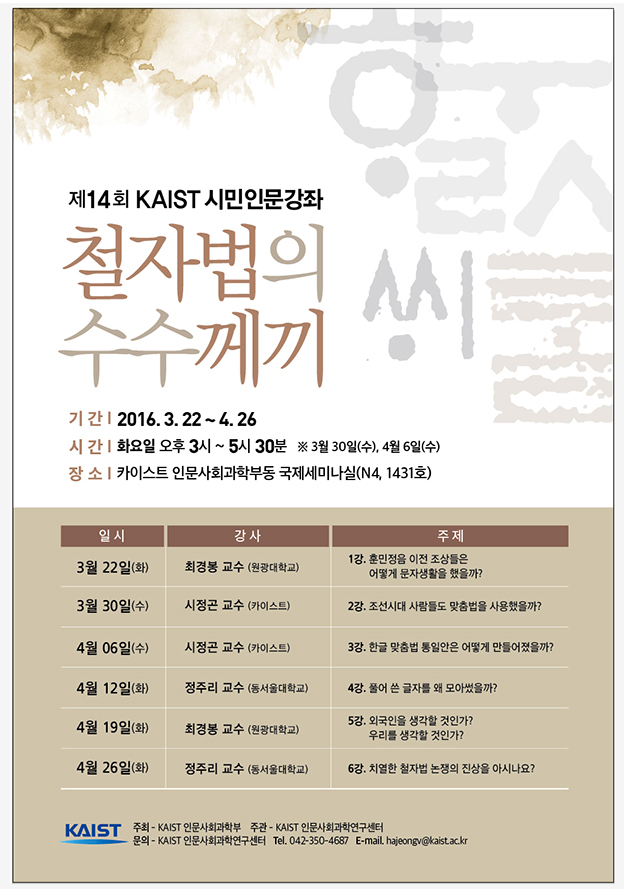event
The School of Humanities and Social Sciences at KAIST will offer public lectures on the Korean language and alphabet, Hangul, from March 22, 2016 to April 26, 2016.
The lectures, which are entitled “The Riddle of Hangul,” will take place on campus in Daejeon.
A total of six lectures will be held on such topics as the origin of Korean, the grammar of ancient Korean in the Chosun Dynasty (1392-1897), and subsequent developments in contemporary Korean.
Professor Jung-Hoon Kim, who is responsible for organizing the public lecture program, said, “The audience will have an interesting opportunity to understand the history of Korean and its mechanism, while reviewing the unique spelling system of Hangul. I hope many people will show up for these wonderful classes.”
For further information and registration, please visit: http://hss.kaist.ac.kr. All lectures, available only in Korean, are free and open to the public.

-
research Image Analysis to Automatically Quantify Gender Bias in Movies
Many commercial films worldwide continue to express womanhood in a stereotypical manner, a recent study using image analysis showed. A KAIST research team developed a novel image analysis method for automatically quantifying the degree of gender bias in films. The ‘Bechdel Test’ has been the most representative and general method of evaluating gender bias in films. This test indicates the degree of gender bias in a film by measuring how active the presence of women is in a film. A
2019-10-17 -
policy The Center for Anthropocene Studies (CAS) Opens
KAIST will start Anthropocene research, a convergence field of study, to address issues related to the commencement of human activities that have had scientific, industrial, and economic impacts on the Earth’s ecosystem. The National Research Foundation (NRF) of Korea endorsed the KAIST Center for Anthropocene Studies as its Convergence Research Center project. Anthropocene refers to a new geological age in which various polluting materials that humans have made during the post-industr
2018-06-05 -
fund KAIST receives $20 million donation for futures studies
A retired businessman, Moon-Soul Chung, the former chief executive officer of Mirae, Inc., a semiconductor equipment company in Korea, today donated USD 20 million to the Graduate School of Future Strategy at KAIST. It was Chung's second contribution to KAIST—his first donation of USD 28 million in 2001 supported the construction of the Bio and Brain Engineering building, a major research center on campus where biotechnology and information technology converge. Estab
2014-01-13 -
event KAIST Cultural Festival - the 2nd rocklassic
KAIST Cultural Festival - the 2nd rocklassic - Unique music festival by KAIST students mixed with creation, performance, and science - Result of creative classes - All activities from performance planning to strings manufacturing will be carried out by students themselves - At the outdoor theater in KAIST, 7:30 p.m. Sunday, September 10 Crossover music festival pursuing balanced mixture of Rock and Classic will be held by KAIST students. KAIST (President Nam-Pyo Suh) will open ‘KAIST C
2006-09-11 -
fund Professor Kim Donates W5 Bil. to KAIST
Korea Times 2004.5.21 By Kim Tae-gyu / Staff Reporter A professor from the Korea Advanced Institute of Science and Technology (KAIST) has donated his inherited wealth of 5 billion won to the state-owned institute. The KAIST announced professor Kim Dong-won contributed 5 billion won in properties and cash, which he inherited from his father, who passed away late last year. ``Professor Kim has asked us to spend the contribution in the development of Korea’s science in accordance with the lat
2004-05-21